July 1, 2025

The article examines the critical factors that will shape the salaries of behavioral specialists in 2025. It emphasizes key elements such as:
Each of these factors is shown to have a significant impact on salary levels. Evidence indicates that advanced degrees, relevant certifications, and extensive experience can lead to substantial increases in earnings. This underscores the necessity of continuous education and strategic career decisions in maximizing salary potential within this field.
The landscape of behavioral specialist salaries is evolving rapidly, with the demand for Board Certified Behavior Analysts (BCBAs) projected to soar in the coming years. Understanding the dynamics of salary determination is crucial for both job seekers and employers navigating this competitive market.
This article delves into ten key factors that will shape behavioral specialist salaries in 2025:
How can professionals leverage this knowledge to maximize their earning potential? As the field grows, the insights provided here will be invaluable for those looking to thrive in this dynamic environment.
Did you know that the demand for Board Certified Behavior Analysts (BCBAs) is projected to increase by 25% by 2026? Hire ABA is a specialized recruitment platform designed to connect BCBAs with premier job opportunities in the rapidly expanding field of Applied Behavior Analysis therapy. This platform simplifies the hiring process, ensuring that qualified professionals can easily find positions that align with their expertise and career aspirations.
Our personalized resume assessments evaluate candidates' experiences and career goals, significantly impacting job matching success. By utilizing advanced job fit scoring, we identify opportunities that correspond with their skills, preferences, and desired locations. This innovative approach not only enhances job matching but also contributes to the overall growth of the ABA therapy sector, reflecting the increasing recognition of BCBAs as essential members of healthcare and educational teams.
The user-friendly interface allows candidates to effectively showcase their skills, while employers benefit from a more efficient talent acquisition process. Are you facing challenges in hiring qualified behavior analysts? Submit your resume today to discover the best job opportunities tailored to your skills.
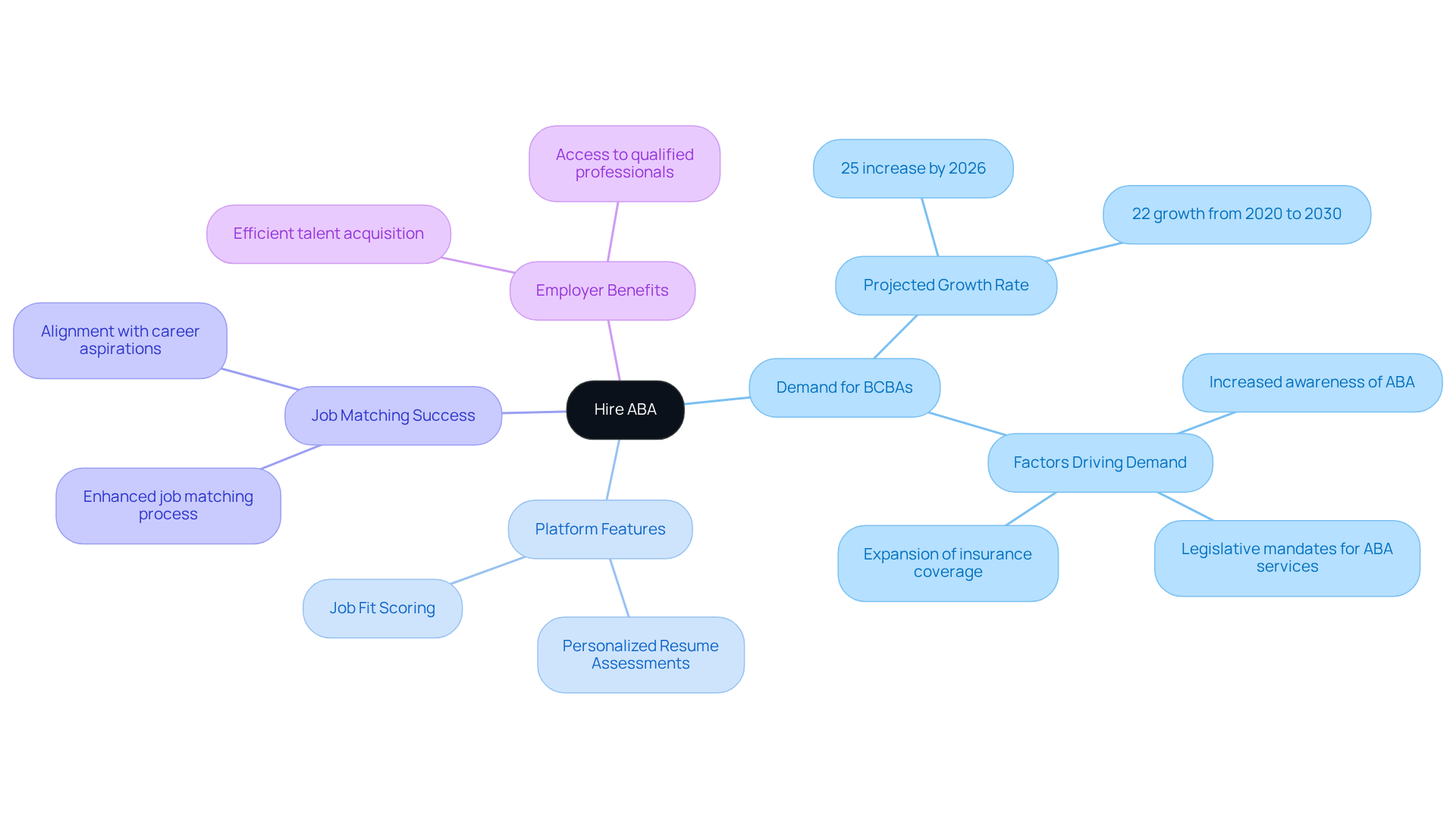
The degree of education significantly impacts the behavioral specialist salary, a fact that cannot be overlooked. Individuals holding advanced qualifications, such as a master's or doctoral degree in behavior analysis, typically earn a higher behavioral specialist salary than those with only a bachelor's degree.
For instance, a Board Certified Behavior Analyst (BCBA) with a master's degree can expect an average behavioral specialist salary of $80,000, while those with a doctoral degree may see their behavioral specialist salary exceed $100,000.
This trend not only highlights the financial benefits of advanced education but also underscores the importance of pursuing higher qualifications to enhance one's earning potential, including a behavioral specialist salary, in this field.
Are you considering how education can elevate your career? Now is the time to invest in your future and explore opportunities for advancement.
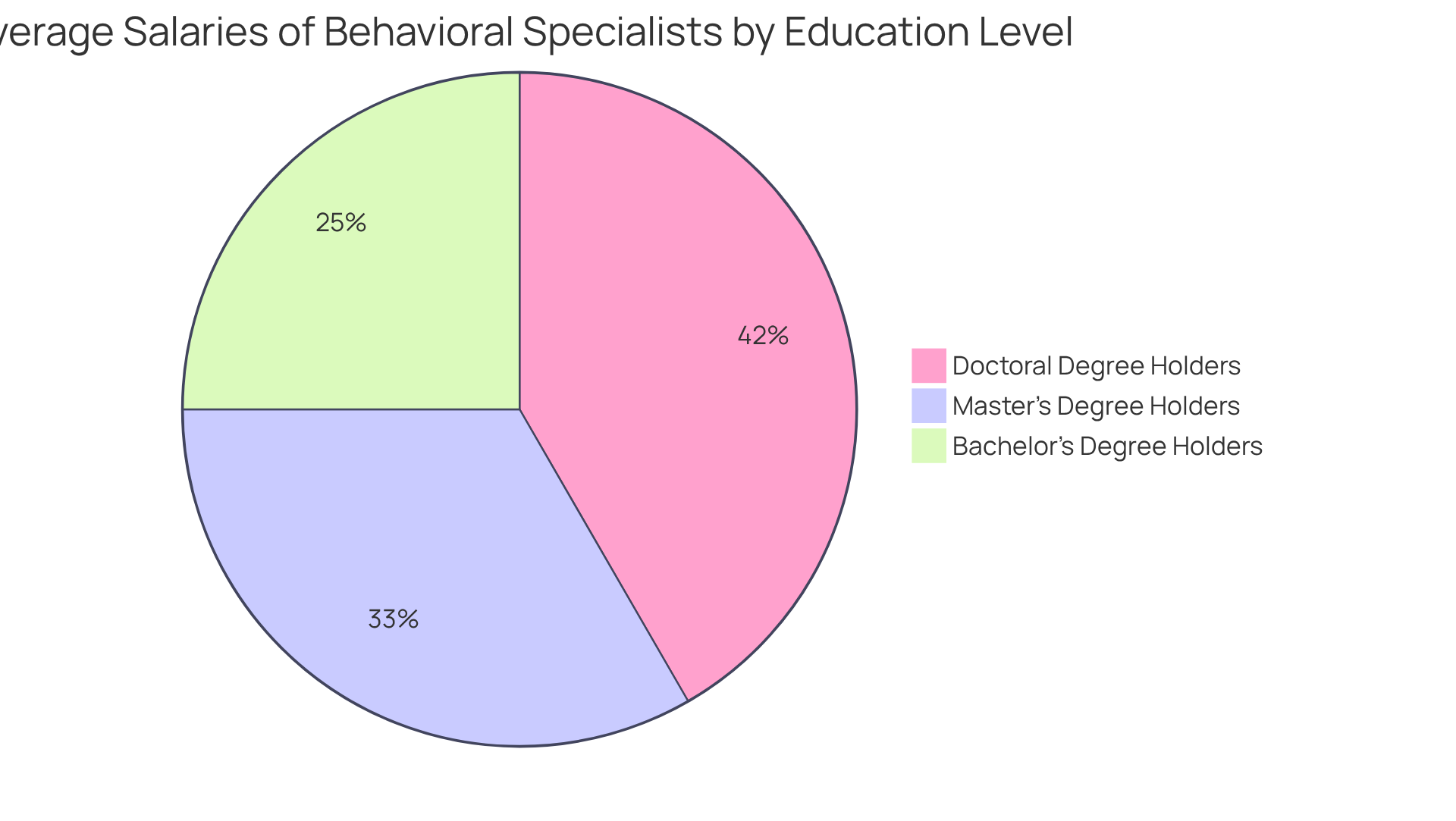
Certifications and licenses are crucial in determining the behavioral specialist salary. The demand for Board Certified Behavior Analysts (BCBAs) has surged, with a staggering 4,209% increase from 2010 to 2020, highlighting the growing recognition of their expertise. This certification not only enhances job opportunities but also significantly boosts the behavioral specialist salary. For example, the behavioral specialist salary usually falls between $70,000 (25th percentile) and $89,500 (75th percentile) annually, while those without certification tend to earn significantly less.
Maintaining licensure often requires ongoing education, which further enhances an individual's qualifications and can positively impact their behavioral specialist salary. Employers frequently support behavior analysts in their professional development, ensuring they remain informed about best practices. In high-cost living areas like California and New York, the behavioral specialist salary tends to be even greater, with independent practitioners potentially charging fees nearing $100 per hour.
As the field continues to evolve, the value of certification becomes increasingly apparent. For those pursuing a career in Applied Behavior Analysis, obtaining the BCBA certification is not just beneficial; it is essential. Are you ready to enhance your hiring strategy? Consider the advantages of partnering with Hire ABA to secure top talent in this growing field.
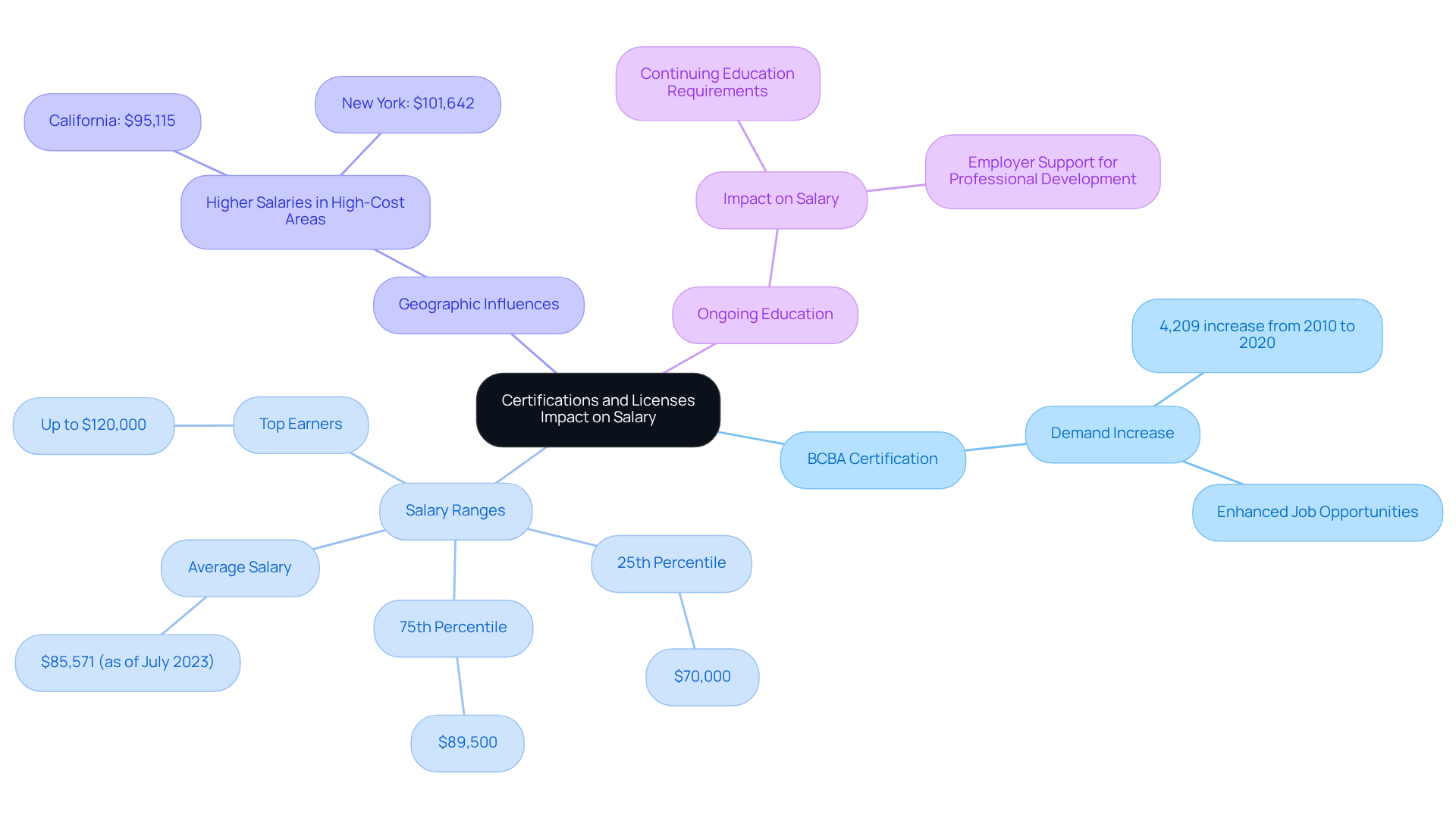
Behavioral specialist salary, particularly for Board Certified Behavior Analysts (BCBAs), demonstrates significant variation based on geographical location. For instance, states with a high cost of living, such as California and New York, frequently offer compensation exceeding $90,000 annually. Conversely, areas with lower living costs, including Alabama, Florida, and Georgia, may see earnings closer to $60,000. This disparity underscores the critical need to consider location when evaluating job offers and negotiating compensation, particularly in relation to the behavioral specialist salary.
Notably, Alaska boasts the highest average income for board-certified behavior analysts at approximately $99,394, followed closely by Connecticut at $89,701. In contrast, states like Alabama and Florida typically present lower ranges, around $58,657.
Furthermore, the behavioral specialist salary for behavior analysts in private practice can exceed $100,000 annually in certain cases. Additionally, the economic environment and demand for BCBAs in specific regions can further influence compensation levels, with stronger job markets often yielding higher remuneration. Understanding these geographical impacts is essential for professionals in the field, as they can significantly affect the behavioral specialist salary and career decisions.
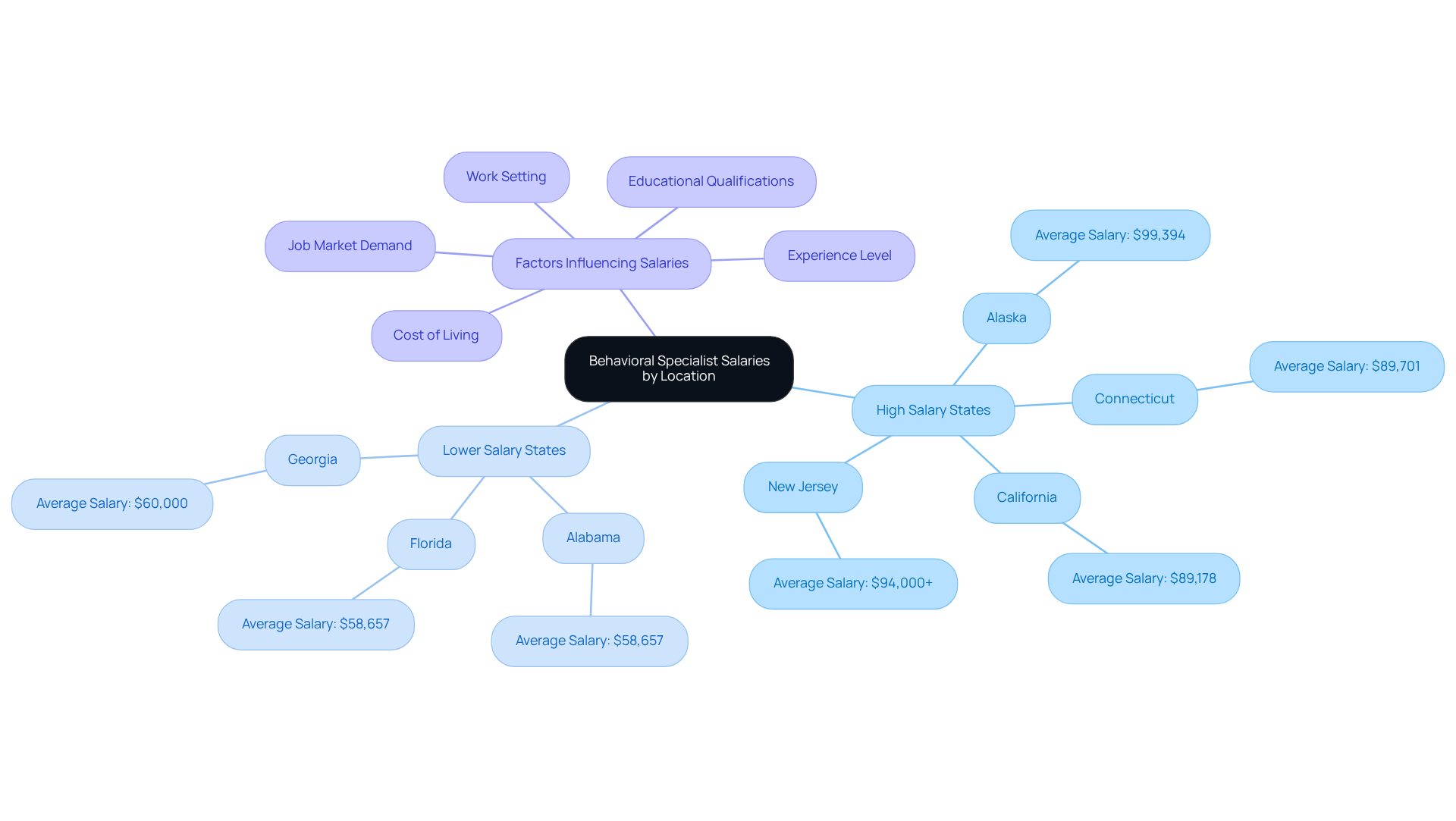
Work experience is pivotal in determining the behavioral specialist salary. Salaries for entry-level roles in this field typically range between $60,000 and $75,000, which reflects the behavioral specialist salary. As professionals accumulate experience, the behavioral specialist salary increases significantly.
For those with:
This income trajectory underscores the necessity of gaining experience and pursuing advanced certifications or specializations, which can further elevate earning potential in the dynamic domain of Applied Behavior Analysis.
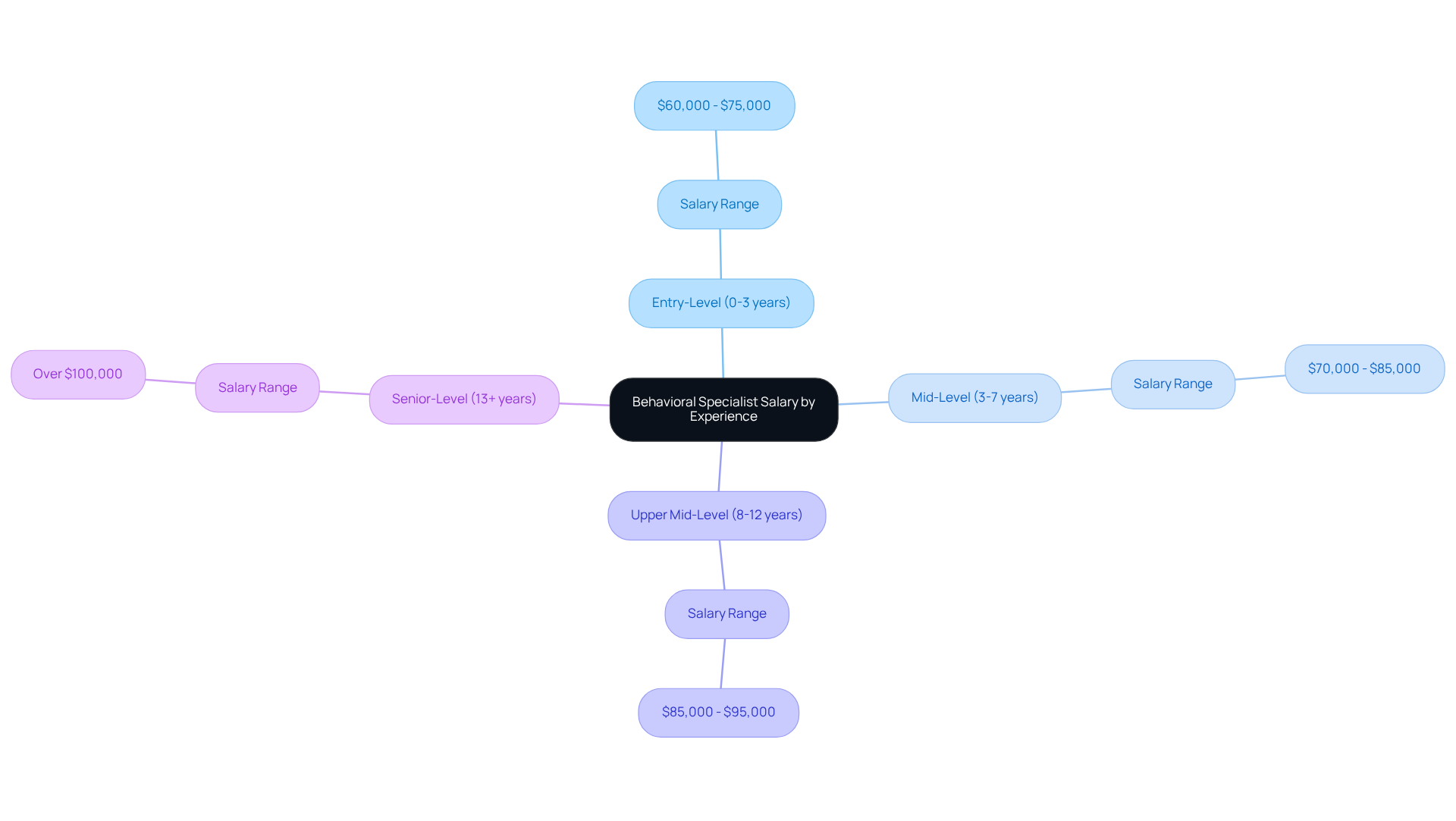
The type of employer plays a crucial role in shaping compensation expectations regarding behavioral specialist salary. Notably, individuals in private practice or specialized clinics tend to earn a higher behavioral specialist salary, with annual earnings ranging from $80,000 to over $100,000. This underscores the potential for substantial income within this sector. Conversely, positions in educational settings, such as schools, typically offer a lower behavioral specialist salary, which averages around $66,678. This highlights the financial disparities that exist across various workplaces.
While clinical roles may command higher pay due to their specialized nature, educational positions often provide other valuable benefits, including job stability and a structured work schedule. As the demand for Board Certified Behavior Analysts (BCBAs) continues to surge—projected to grow by 22% over the next decade, especially in urban areas where behavioral health services are in high demand—job seekers are encouraged to strategically target their applications to align with the most lucrative opportunities in the field.
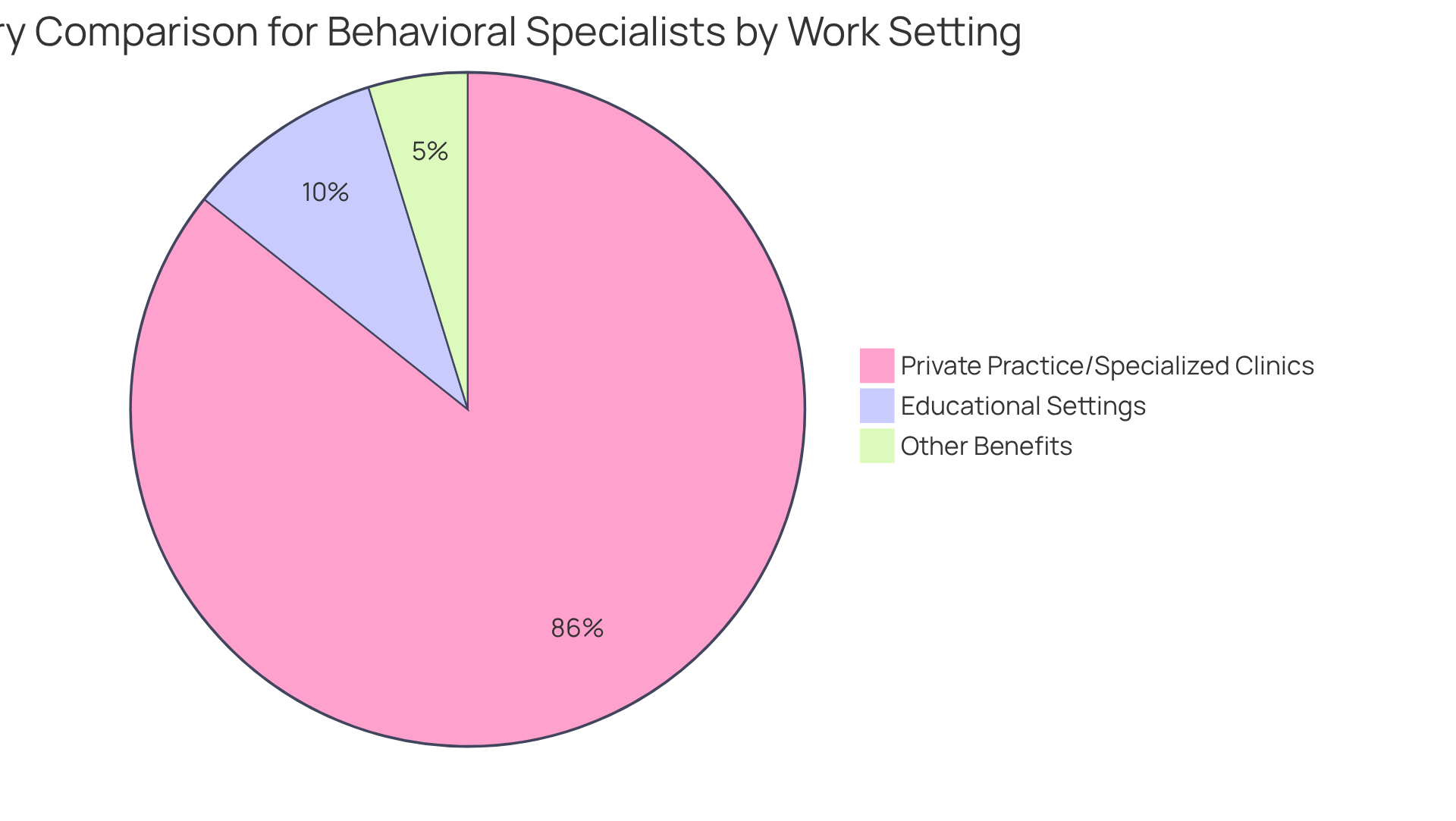
Job responsibilities and specializations significantly influence the behavioral specialist salary. Consider this: the demand for specialized skills in Applied Behavior Analysis (ABA) therapy is projected to increase by 25% by 2026. This surge underscores the lucrative opportunities available for those who pursue specialization in their careers. For instance, Board Certified Behavior Analysts (BCBAs) focusing on areas such as autism spectrum disorders or organizational behavior management often command higher compensation due to the specialized skills required. The typical behavioral specialist salary for BCBAs is approximately $69,788, with the 25th percentile earning $70,000 and the 90th percentile reaching as high as $120,000. Furthermore, individuals in supervisory or leadership positions typically earn more than their colleagues in direct service roles, with the behavioral specialist salary ranging from $80,000 to over $120,000, depending on the complexity of the role.
Reflect on your current hiring challenges: Are you equipped to attract top talent in this growing field? In New Jersey, the behavioral specialist salary for behavior analysts averages $98,707, while those in Alaska earn approximately $94,011. As of July 2023, the reported average behavioral specialist salary for BCBAs is $85,571 annually. Acquiring BCBA certification can significantly enhance earning potential, frequently leading to a higher behavioral specialist salary by 10-20% or more.
To capitalize on this growing demand, consider the benefits of using Hire ABA for recruitment. With our platform, you can connect with qualified professionals ready to meet your organization's needs. Don't miss out on the opportunity to secure the best talent in the field—partner with Hire ABA today.
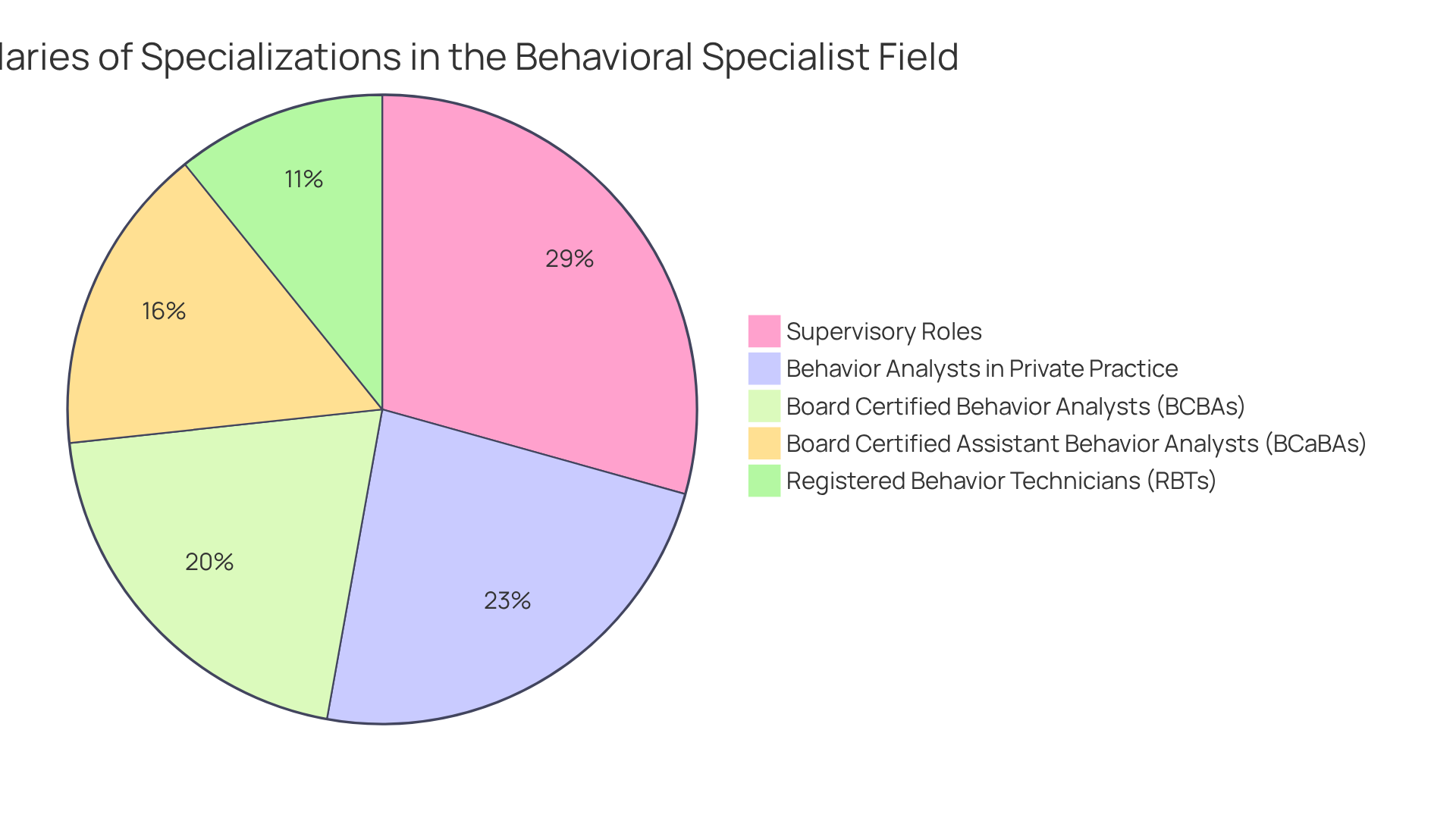
Market demand significantly influences the behavioral specialist salary for Board Certified Behavior Analysts (BCBAs). Did you know that the job growth rate for BCBAs is projected to reach an impressive 22% over the next decade? As awareness of mental health issues and the need for effective solutions increases, demand is expected to rise correspondingly through 2029.
In high-demand regions like California, where the average behavioral specialist salary is around $90,556, BCBAs can earn upwards of $100,000 in New Jersey. Top earners in specialized BCBA roles can command a behavioral specialist salary that ranges from $85,000 to $151,000, reflecting the competitive nature of these markets. In contrast, less competitive areas may see compensation around $70,000.
This disparity underscores the necessity for professionals to remain attuned to job market trends and regional demands, as these factors directly impact the behavioral specialist salary. Furthermore, specialized skills in areas such as:
can lead to a 15-25% increase in compensation. This further highlights the importance of continuous career development and specialization in maximizing earning potential.
Are you aware of how these trends could affect your hiring strategy? Consider leveraging Hire ABA to navigate the evolving landscape and secure top talent.
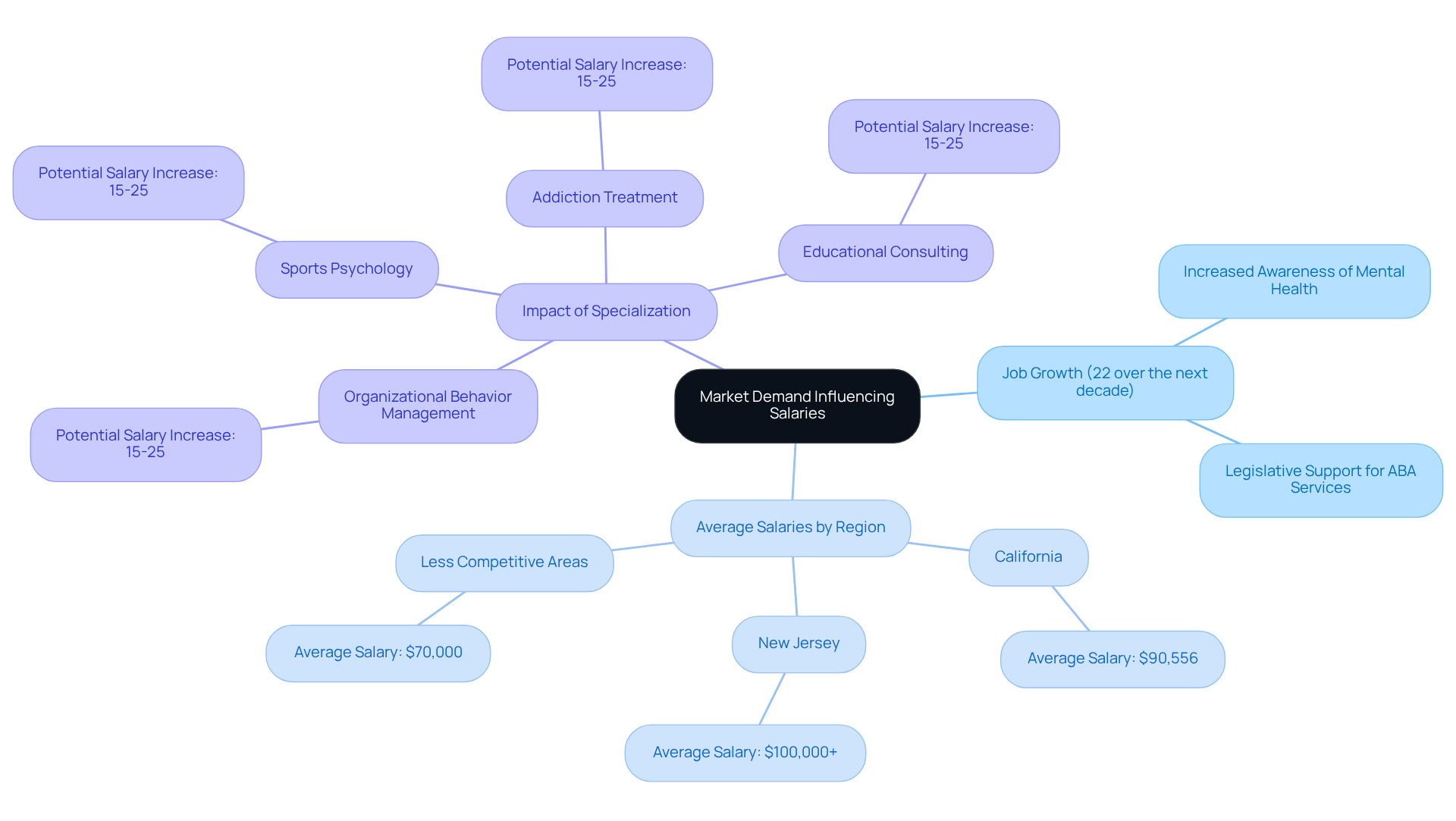
Networking plays a pivotal role in shaping the behavioral specialist salary packages. With the demand for behavior analysts expected to rise by 25% by 2026, establishing a strong network is crucial. Building connections with industry experts, participating in conferences, and joining trade associations can greatly improve job opportunities and facilitate discussions about higher compensation. For instance, referrals from established professionals often lead to positions with more attractive compensation packages. Engaging actively in networking can yield salary increases of 10% or more, underscoring its significance as a strategic approach for career advancement in the competitive landscape of Applied Behavior Analysis.
The behavioral specialist salary for analysts with 1-5 years of experience typically ranges between $60,000 and $75,000, making effective networking even more vital for maximizing earning potential. As Laura NG, Clinical Operations Manager, observes, "Behavior analysts possess a unique skill set in high demand due to the increasing prevalence of autism and other behavioral disorders." To leverage networking effectively, consider attending industry conferences and joining professional organizations that align with your career goals. How can you enhance your networking efforts today to secure a more lucrative position tomorrow?
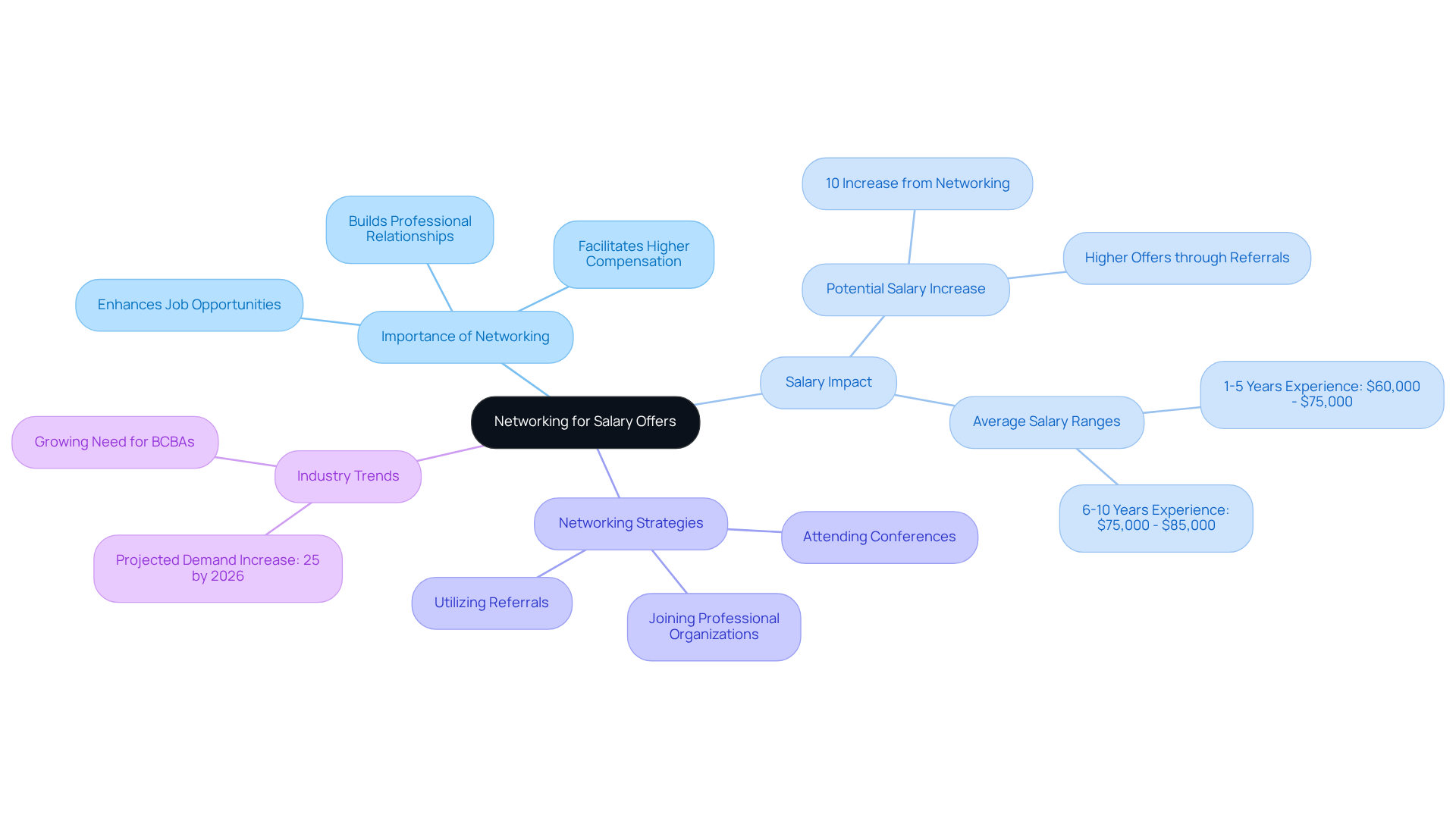
Ongoing education is essential for enhancing the behavioral specialist salary among behavioral experts, particularly Board Certified Behavior Analysts (BCBAs). Did you know that the demand for skilled BCBAs is projected to increase by approximately 20% over the next eight years? This underscores the vital role of continuous learning in this field. Engaging in workshops, obtaining additional certifications, and pursuing advanced degrees can significantly increase the behavioral specialist salary. For example, BCBAs who actively pursue ongoing education can see a behavioral specialist salary increase of 15% or more over time. Brighter Strides ABA highlights that higher education levels correlate with higher behavioral specialist salaries for BCBAs.
This dedication to professional growth not only sharpens individual competencies but also boosts overall marketability in a competitive job market. Employers are increasingly recognizing the importance of continuous learning, often offering financial support for development opportunities such as conferences and workshops. This trend further motivates behavior analysts to elevate their qualifications. However, it is crucial to address the gender gap in BCBA earnings, where female professionals earn less than their male counterparts. Ongoing education and career advancement are pivotal in rectifying such disparities.
Moreover, the cost of living in regions like New Jersey is about 30% higher than the national average, which affects salary dynamics. This reality emphasizes the necessity for BCBAs to engage in continuous learning to maximize their behavioral specialist salary. Are you facing challenges in hiring qualified professionals? Consider how prioritizing ongoing education can not only enhance your team's expertise but also address the pressing demand for skilled behavior analysts.
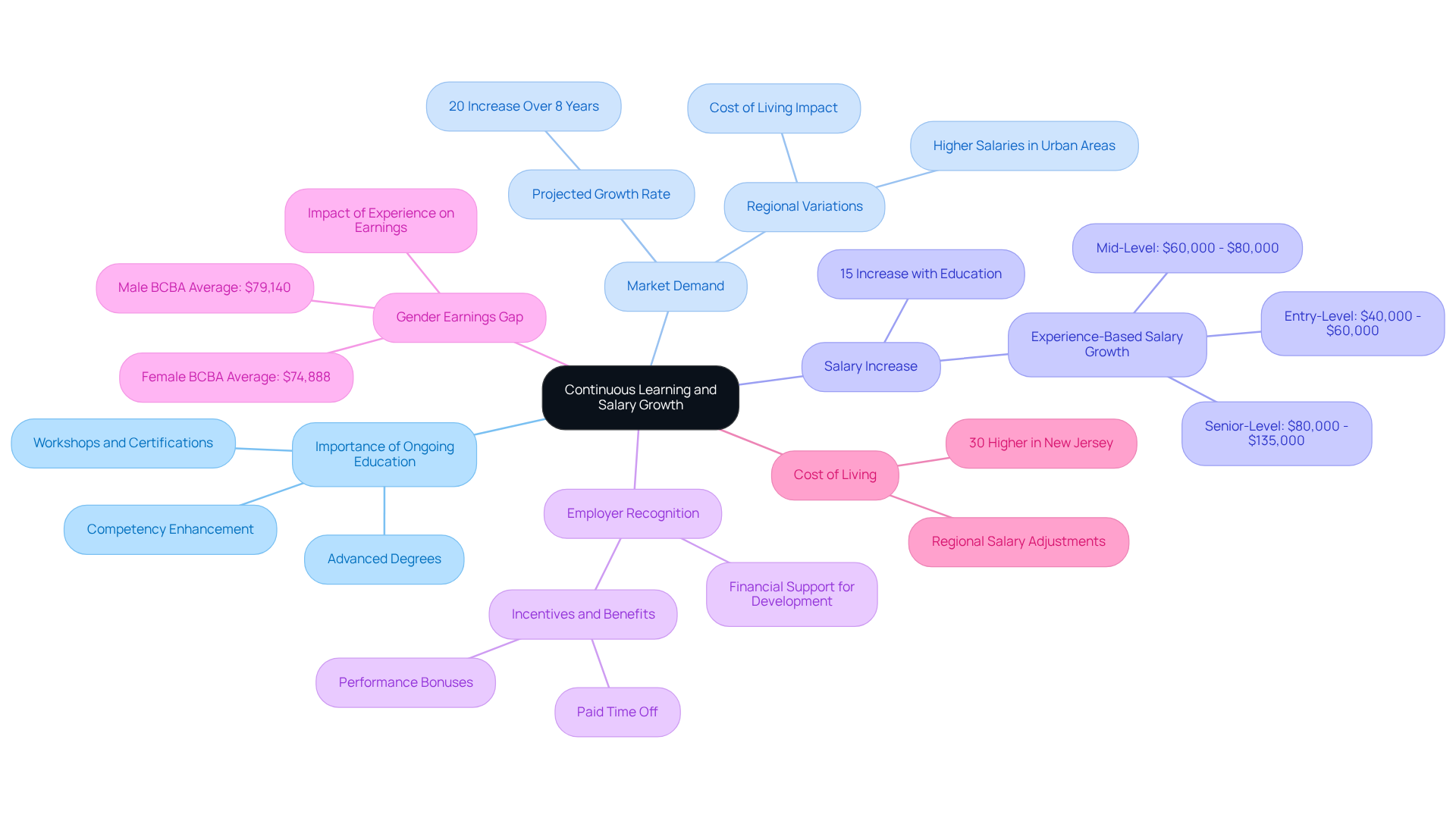
Understanding the various factors that influence behavioral specialist salaries in 2025 is crucial for both professionals and employers in the field of Applied Behavior Analysis. With the demand for Board Certified Behavior Analysts (BCBAs) projected to rise significantly, recognizing how education, certifications, geographical location, work experience, and networking affect earning potential is essential for making informed career and hiring decisions.
Key arguments discussed include:
In light of these trends, it is imperative for individuals in the field to actively pursue professional development and networking opportunities to maximize their earning potential. As the landscape of behavioral analysis evolves, staying informed about market demands and enhancing qualifications will be key strategies for success. Embracing these insights can lead to better career outcomes and improved hiring practices, ultimately benefiting both professionals and the organizations they serve. Are you ready to take the next step in your career? Explore how Hire ABA can support your journey today.
What is Hire ABA?
Hire ABA is a specialized recruitment platform designed to connect Board Certified Behavior Analysts (BCBAs) with job opportunities in the field of Applied Behavior Analysis therapy.
How does Hire ABA improve the job matching process for BCBAs?
Hire ABA utilizes personalized resume assessments and advanced job fit scoring to evaluate candidates' experiences and career goals, helping to identify job opportunities that align with their skills, preferences, and desired locations.
What is the projected demand for BCBAs by 2026?
The demand for Board Certified Behavior Analysts (BCBAs) is projected to increase by 25% by 2026.
How does education level affect the salary of behavioral specialists?
Higher education levels, such as a master's or doctoral degree in behavior analysis, typically lead to higher salaries for behavioral specialists. For example, a BCBA with a master's degree can expect an average salary of $80,000, while those with a doctoral degree may earn over $100,000.
What role do certifications and licenses play in determining salary levels for behavioral specialists?
Certifications and licenses, particularly the BCBA certification, significantly impact salary levels. BCBAs typically earn between $70,000 and $89,500 annually, while those without certification earn less. Maintaining licensure often requires ongoing education, which can further enhance salary potential.
How has the demand for BCBAs changed over the years?
The demand for Board Certified Behavior Analysts (BCBAs) has increased dramatically, with a 4,209% rise from 2010 to 2020, indicating a growing recognition of their expertise.
Are there salary differences based on location for behavioral specialists?
Yes, in high-cost living areas like California and New York, behavioral specialists tend to earn higher salaries, with independent practitioners potentially charging fees nearing $100 per hour.
What should candidates do to find job opportunities through Hire ABA?
Candidates are encouraged to submit their resumes to discover job opportunities tailored to their skills and career aspirations.
Our expert recruitment strategies and AI-driven sourcing ensure that you receive top-notch candidates quickly, without compromising on quality. Whether you’re looking for BCBAs, Clinical Directors, or RBTs, we’ve got you covered.